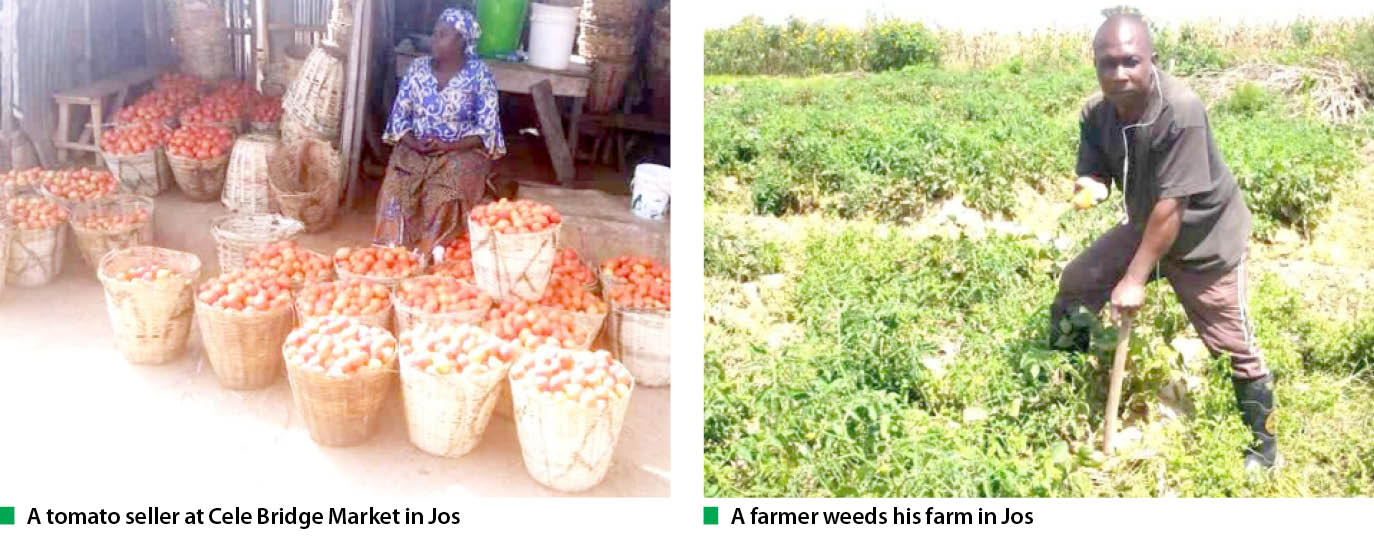Pest invasion: Tomato farmers declare losses amid price stability
Tomato farmers in Plateau State have declared losses following the invasion of their farms by pests. The situation wreaked a lot of havoc as they were not able to tackle it. Recounting their ordeal, some of the farmers said they applied all the insecticides and pesticides they knew, but to no avail. Others said they […]

Tomato farmers declare losses
Tomato farmers in Plateau State have declared losses following the invasion of their farms by pests. The situation wreaked a lot of havoc as they were not able to tackle it.
Recounting their ordeal, some of the farmers said they applied all the insecticides and pesticides they knew, but to no avail. Others said they even sought the assistance of experts to unravel the problem and find solution, but that effort did not yield any meaningful result.
They explained that as the tomatoes began to germinate and bear fruits, some parts of the leaves would begin to dry up and the tomatoes itself would begin to turn brown from outside, while others would have black dots. The effect is that the tomatoes rotten inside and would no longer be good for consumption.
As soon as the farmers tried to get over the impact of the disease, pests took over their farms and began to wreak havoc on the crops.
A farmer at the Lamingo area of Jos North Local Government, Marcel Ndubuisi, said he had lost most of his tomatoes to the disease and the pest. He also tried everything he could to control the situation without success.
Ndubuisi said he invested N500,000 in the last planting season but hardly realised N60,000, adding that he is currently in debt and looking for a way to come back.
He said many farms were completely destroyed and they did not get any help from any quarters.
“When the Agric Services, Training Centre (ASTC) and Marketing Limited used to be effective, whenever such thing occurred we would go to them and they would find a solution for us. They often sent experts to the farms to carry out tests and take samples, and then, eventually provide an effective solution/the right treatment or chemical that would tackle the problem. But today, even if you shout to the high heavens no one listens to you. We have to bear the problem ourselves,” he said.
Ndubuisi said that because of the situation at hand, he hardly went to farm, especially considering the debt before him. He added that he almost quit, but later decided to hold on, trying to get funds to enable him go back to the farm. He also said he hardly got tomatoes to eat at home.
The secretary-general of the National Tomato Growers, Producers and Marketers Association of Nigeria, Plateau State chapter, Joshua Ngwen, said they were aware of the problem and the farmers’ losses, noting that they have been enlightening farmers on what to do to tackle the problem.
He said they advised the farmers not to use only one pesticide against the “white flies,” the pests attacking the tomatoes, as it had developed resistance. They ought to use up to three different pesticides, which should be applied interchangeably. In such manner, according to him, the pests cannot develop resistance to the insecticides.
He also said there was an insecticide trap that uses solar light to trap pests, which a farmer can buy and put in his/her farm. It can stop adult pests from laying eggs to reproduce.
The tray costs N6,000, he said, adding that it is powered by water, and once it is dark, the light comes up and traps the pests.
He also said they had trained some farmers on that and more, and are still organising workshops to enlighten them on how to tackle pests and diseases invading farms.
Meanwhile, the price of tomatoes seems to stabilise despite the losses the farmers incurred as a result of the pest and disease invasion.
The woman leader of Tomatoes Market, by Cele Bridge in Jos, the Plateau State capital, Ruth Izang, confirmed that despite the ugly situation, which has caused shortage of tomato supply to the market, the price of the commodity is still stable.
She said that during the Christmas festivity they sold a basket of tomato at N4,000, but this January, a basked is now N2,800, arguing that there is a kind of stability.
She called on the authorities to come to the farmers’ aid so that they won’t get discouraged and quit tomato farming because it would have negative consequences, not only on the farmers but the society at large since the commodity is essential, both for consumption and business.
